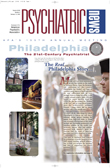There’s more to Philadelphia than blocks of historic buildings, a cracked but cherished bell, street vendors selling hot pretzels and Italian water ice, and sites associated with a certain monosyllabic boxer who made the steps of the city’s world-renowned art museum famous.
But wait—if that’s all Philadelphia has to offer, it’s not a bad list, is it?
And while we’re at it, let’s clear up some misconceptions about the city. The man famously noted for insulting Philadelphia was actually one of its own sons, and his son was born there as well. In the end, it was the name of this city that he wanted on his gravestone: “Here lies W.C. Fields. I would rather be living in Philadelphia.” (Compare that with what he had to say about San Francisco: “I was married once—in San Francisco. I haven’t seen her for many years. The great earthquake and fire in 1906 destroyed the marriage certificate. There’s no legal proof. Which proves that earthquakes aren’t all bad.”)
The bottom line is that it’s time to take a new look at one of America’s oldest cities and appreciate again the role it played in not only the birth of the United States but also that of psychiatry—all this while you take advantage of the many scientific sessions that make up the profession’s premier educational meeting.
Yes, this is the year to be in Philadelphia, and this issue of Psychiatric News will fill you on the city’s many historic, cultural, and entertainment attractions while giving you a preview of the meeting’s scientific program.
“This is where APA was founded, and it is a pleasure to return to Philadelphia for the 155th annual meeting,” said Philip R. Muskin, M.D., chair of APA’s Scientific Program Committee. “The last time the meeting was held in Philadelphia was in 1994, when APA celebrated its sesquicentennial anniversary. In 1844 the superintendents of 13 insane asylums founded our organization at the Institute of Pennsylvania Hospital [see story on
page 13].
Muskin continued, “As Dr. Richard Harding’s theme is ‘The 21st-Century Psychiatrist,’ we will see just how much the profession of psychiatry has changed since then. This meeting will highlight the tremendous scope of psychiatry. However, we cannot ignore the tragic events of the recent past, and there will be numerous sessions that focus on many aspects of the attacks, terrorism, and trauma. Early data indicate this will be a well-attended meeting, so make hotel reservations now and register early.”
The “early data” to which Muskin referred are the number of hotel reservations that have already been made for the Philadelphia meeting—they are running far ahead of this time last year. Muskin speculated that perhaps this is due to psychiatrists’ having a greater need than usual to connect with colleagues because of the September 11 terrorist attacks.
If attendees want information related to the mental health implications of the terrorist attacks, the 2002 annual meeting is the place to go. Here are just a few of the sessions that have been scheduled on trauma, PTSD, and other topics related to terrorism:
• “The Mental Health Community Response to the World Trade Center Disaster,” chaired by Randall D. Marshall, M.D., Noon Forum 1, Monday, May 21
• “Evil,” chaired by Samuel C. Klagsbrun, M.D., Noon Forum 3, Monday, May 21
• “Treatment of Trauma Survivors: Theory Versus Practice,” by Rachel Yehuda, Ph.D., Discussion Group 15, Tuesday, May 21, 11 a.m., in a “Meet the Authors” session
• “The Psychological Wounds of National Trauma: Causes, Consequences, and Treatments,” Symposium 36, Tuesday, May 21, at 2 p.m.
• “America Attacked: APA and Its Members Respond,” sponsored by the APA Committee on Psychiatric Dimensions of Disasters, Symposium 42, Tuesday, May 21, 2 p.m.
• “Terror, Horror, and Fright: Past and Current Perspectives,” by Lenore C. Terr, M.D., Lecture 17, Wednesday, May 22, 9 a.m.
• “Healing the Soul in the Age of the Brain: Reflecting on the Meaning of Psychiatry After September 11,” by Elio J. Frattaroli, M.D., Lecture 21, Wednesday, May 22, 11 a.m.
• “Killing in the Name of God: Osama Bin Laden and Radical Islam,” chaired by Jerrold M. Post, M.D., Noon Forum 9, Wednesday, May 22
• “PSYOP: Psychological Operations in the War Against Terrorism,” chaired by Ronnie S. Stangler, M.D., Noon Forum 12, Thursday, May 23
Nonetheless, terrorism is only one topic currently claiming psychiatry’s attention. Another is health care economics. Muskin was pleased to announce that this year’s lecturer at the Convocation of Fellows will be Rodger McFarlane, who will present the William C. Menninger Memorial Lecture on “Psychiatry and the Medical Consumer Movement.” McFarlane is the former executive director of the Gay Men’s Health Crisis and Broadway Cares/Equity Fights AIDS. He is also the author of the best-selling book The Complete Bedside Companion. To make it easier for more people to attend this important event, during which APA inducts its new fellows and presents its awards, the starting time is now earlier than it was in the past, 6 p.m.
As usual, Muskin pointed out, the scientific program will provide cutting-edge information that psychiatrists can take back to their clinical practices and apply to patient care. One new format will be particularly useful for this purpose: “Advances in Psychopharmacology: An Update on the Essentials of Clinical Psychopharmacology,” led by two of the country’s best-known psychopharmacology researchers, Alan F. Schatzberg, M.D., and Charles B. Nemeroff, M.D. The session will be held on Monday, May 20, from 2 p.m. to 5:30 p.m.
The session on which the psychopharmacology session was patterned, the “Research Advances in Psychiatry” symposium, has often been standing room only through the years. Once again it will feature an all-star group, including chair Herbert Pardes, M.D., Robert Carney, M.D., Alexander Glassman, M.D., Herbert Meltzer, M.D., and Carol Tamminga, M.D. This year’s title is “Understanding the Brain and Body in the Treatment of Depression and Schizophrenia.”
Yet another feature of the annual meeting that psychiatrists won’t want to miss is a special track of sessions planned in collaboration with the federal Substance Abuse and Mental Health Services Administration (see
page 37). The series focuses on the medical and psychiatric aspects of substance abuse and mental illness.
U.S. Surgeon General David Satcher, M.D., is receiving APA’s Patient Advocacy Award on Wednesday, May 22, at 9 a.m. He is expected to discuss his ground-breaking “Mental Health: A Report of the Surgeon General.” This report has done much to draw attention to the country’s floundering mental health care system and the lack of access that many mentally ill people have to the services they need.
Complementing the scientific sessions will be an outstanding collection of outside lecturers. Among them are Philip G. Zimbardo, Ph.D. Zimbardo is a professor of psychology at Stanford University and is internationally recognized for his innovative research in many areas of social psychology. He will present the lecture “Evil in the World and Terror in Our Nation: Transferring Vulnerabilities into Resilience” on Wednesday, May 22, at 9 a.m. Zimbardo will discuss the psychology of evil and how ordinary people can be induced to commit sadistic and even heinous acts that are alien to their usual behaviors.
The list of don’t-miss sessions doesn’t end there, as evidenced by the preliminary program that begins on
page 8.
“If you haven’t been to an annual meeting lately—and even if you have—this is the meeting to attend,” said Muskin. “Not only do many of us feel compelled to seek out our friends and colleagues in a way that we might not have before given the terrible events of September 11, but also we’ll be fortunate enough to have that happen in a city whose museums, historic attractions, restaurants—even street food—are unmatched by few other cities in the world. It is a great place for people on their own at the meeting or with their families. I look forward to seeing you in Philadelphia.” ▪


